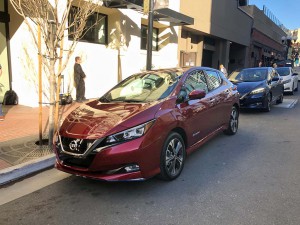
Its been a decade since Nissan broke ground with the rollout of its original Leaf, the first mass production battery-electric vehicle. The second-generation Leaf has lots more competition these days but remains a standout, at least according to the members of the Green Car of the Year jury.
The Leaf took honors for being the 2019 Connected Green Car of the Year during a ceremony at the auto show in Washington, D.C. Thursday afternoon, one of two awards presented at the annual event. Chevrolet, meanwhile, took honors for 2019 Green Car Technology of the Year with its Dynamic Fuel Management system.

“Nissan’s Leaf has impeccable ‘green’ credentials and a highly-desirable array of advanced and connected features,” said Ron Cogan, editor and publisher of Green Car Journal, which has created a series of awards for environmentally friendly vehicles, some awarded in Washington, D.C., others at the annual Los Angeles International Auto Show.
The second-generation Leaf, launched was introduced for the 2018 model year and brought a major change in design and a big bump in range, to about 150 miles per charge. The Leaf Plus, now added to the line-up for 2019, allows the vehicle to travel up to 226 miles between charges.
(Green Car Journal reveals finalists for awards. Click Here for the story.)

But the award delivered on Thursday focused on the vehicle’s onboard technology – the Leaf and Leaf Plus remaining potential competitors for the Green Car of the Year umbrella award to be announced in Los Angeles. The Connected Green Car award honored the battery-car for features such as ProPilot Assist, which allows the vehicle to operate nearly hands-free on well-marked roadways, making it easier for a motorist to stay in their lane and safely follow the flow of traffic.
It went up against such competitors as the new Audi e-tron, the Subaru Crosstrek Hybrid, the Tesla Model 3 and the Toyota RAV4 Hybrid.
“We’re honored to see the Nissan Leaf recognized with this award for its amazing technology and contribution to reducing carbon footprints around the globe,” said Brian Maragno, director of EV sales and marketing at Nissan North America.
“With over 400,000 sold globally, the Nissan Leaf is the world’s best-selling electric vehicle and is the embodiment of Nissan Intelligent Mobility, our vision for how drivers can be connected to their vehicles in new and exciting ways.”
(Click Here for more about our first drive in the 2019 Nissan Leaf Plus.)
Among other things, Leaf owners can precondition the vehicle’s cabin, check the state of charge and handle other functions remotely. In some countries, Leaf’s battery pack can be used to serve as a backup power source in the event the grid goes down, as well.

Though the various Green Car awards have traditionally focused on alternative powertrain technologies, especially battery and hydrogen, conventional gas and diesel systems have also won a share of honors. That’s the case this year with Chevrolet taking the 2019 Green Car Technology of the Year for its Dynamic Fuel Management system.
The system is designed to let a gas engine to constantly respond to driving conditions, as well as driver input, to yield the best balance of performance, mileage and emissions. In some cases, it allows an engine to operate on only a single cylinder. The system is now in use on a variety of Chevy products, including its big Silverado pickup.
“Chevrolet Dynamic Fuel Management epitomizes the innovation that continues to make internal combustion engines more efficient and relevant in an increasingly electrified world,” said Green Car’s Cogan.
(To see more about EVs and gas-powered vehicles costing the same by 2022, Click Here.)
Other contenders for the technology award were: Hyundai Nexo Fuel Cell Powertrain, Nissan VC-Turbo Engine, Mitsubishi PHEV Powertrain, and RAM eTorque.







